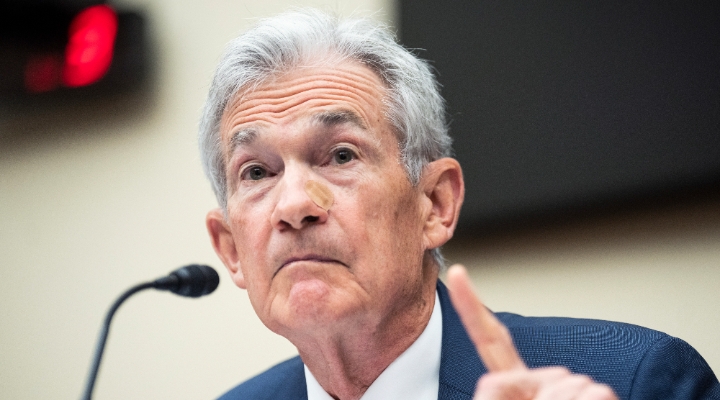
Christmas Deliveries in Chaos
The Christmas post — along with pretty much everything else — will be severely disrupted this year. Royal Mail started a wave of strikes today delaying the delivery of millions of cards and parcels. This has significant knock-on effects for other companies as well. Delivery firm Evri, for example, has already apologised for delays after increased demand for its services — partly due to business and customers trying to avoid the Royal Mail chaos.
It certainly is shaping up to be a Christmas of discontent, with industrial action expected every day between now and December 25 as postal workers join train drivers, nurses, NHS staff, border force staff, teachers, bus drivers and beer brewers in strike action over pay awards. Until now the government’s plan has been to utilise the army to keep essential services going, but this begs the question, are our armed forces big enough to be firefighting on all fronts?
Hipgnosis Cashes in on John Lewis Ad
The best way to spread Christmas cheer is singing loud for all to hear. Well, according to the movie Elf at any rate. It’s a sentiment that Guernsey-based investment company Hipgnosis Songs Fund no doubt agrees with, as it revealed sales had been boosted by John Lewis using one of the songs it owns, All the Small Things by Blink-182, in its latest Christmas advert.
The listed company, which also owns the rights to Christmas classics by Mariah Carey and Michael Bublé, said the festive season helps boost revenues at the fund, which now owns the rights to 65,000 songs. And while most companies might put the CEO forward for interview when releasing their financial results, Hipgnosis – founded by a former manager of Guns n’ Roses – had Bon Jovi’s Richie Sambora performing Livin’ on a Prayer to investors and analysts in London.
Even Finance has Footie Fever
Football has been intertwined with big business for many years now, but this year the commercial side of the beautiful game has reached er, fever pitch. A World Cup year helps keep the hype at near hysteria level, of course. Paris Saint German (PSG) will be hoping that one of their stars will be lifting the golden trophy next weekend – Mbappé, Neymar or Messi – as will their sponsors. PSG isn’t for sale but plenty of football “franchises” have been sold – AC Milan, Chelsea – and Liverpool and Manchester United could be next. Why now? As cash-generating machines with “storied” brands, clubs are attractive to American billionaires. This has also been a year when other assets have let investors down – as James Gard explains in his deep dive on football and finance.
Coal Not Consigned to History Just Yet
The UK government has approved the first new coal mine in decades, just 12 months after it hosted COP26 in Glasgow, where the headline pledge was phasing out the use of this fossil fuel. At the time, countries like India and China were seen as the biggest hurdle to consigning coal to history, not the UK opening a new coal mine in West Cumbria. Supporters argue, somewhat counter-intuitively, that this won’t jeopardise the UK’s climate pledges as it should reduce imports of coking coal for the UK’s steel industry. Critics though have accused the government of hypocrisy, with the government’s own advisory Climate Change Committee dubbing the decision “absolutely indefensible”. Foreign leaders have been equally aghast, with the president of Fiji tweeting, “Is this the future we fought for under the Glasgow Pact? Fossil fuels should be phased OUT - not up”.
FCA Gets Tough on Get Rich Schemes
The regulator plans to get tough on “rogue” adverts, often used to promote high-risk investment schemes into assets like cryptocurrency. There has been a proliferation of these promotions online and on social media in recent years and the FCA is clearly concerned about the number of ordinary savers and investors lured into schemes with no concept of the risks involved. The proposed rules will give the regulator far greater oversight of authorised firms and their promotional material, as well asw cracking down on these rogue ads and third-party “influencers”. But while this may stop legitimate firms bending the rules, it is unlikely to block determined scammers. Investors still need to keep their wits about them and take any social media post tipping a lucrative investment opportunity with a very big pinch of salt.
Be Careful Who You Bank With
Revolut, the London-based digital finance app, is one of a new generation of challengers to the Big Five banks. It has grown rapidly, and last month revealed it now has more than 25 million customers worldwide, making it the UK’s most valuable fintech, according to one survey. But a Radio 4 programme this week warned that some customers were struggling to get refunds after being defrauded. Unlike the UK’s high street banks, Revolut does not have a UK banking licence, and has not signed up to the Contingent Reimbursement Model Code, which aims to ensure those who fall victim to certain types of fraud get full refunds. Revolut says it looks at cases on an individual basis and will look at how effective its warning of potential fraud is, alongside customer behaviour, before making any refund decisions.
Baillie Gifford Prunes Investment Trust Portfolio
“Ruthless weeding” is not a term often associated with investment trust managers. But Baillie Gifford deployed the term when explaining why it sold 20 technology shares in a bid to turn around performance at its popular Monks Investment Trust (MNKS). The Silver-rated growth trust has seen returns shrink in recent months, underperforming its benchmark by 5%. Stocks weeded out include Peloton (PTON), which has failed to replicate the sales of its expensive exercise bikes post lockdowns, and Caravan, a used car retailer, which surprisingly offers car vending machines in the US. Managers at Monks said the “probability of success” of this company was “narrowing”.
Goldman Sachs Hunting for Crypto Bargains
The sharks, or should it be vampire squids, are circling cryptocurrency companies after the implosion of FTX hit valuations across the sector. Goldman Sachs has revealed it is doing ‘due diligence’ on a number of companies, pointing out that although the bankruptcy of one of crypto’s most high-profile companies, run by Sam Bankman-Fried, had hit sentiment’ the underlying technology continues to work. The global investment bank isn’t the only one looking to profit from FTX’s untimely demise. Novelty clothing sellers are flogging ‘classic’ cryptocurrency trading T-shirts with the logo ‘FTX Risk Management Dept’. The design, which comes in a range of colours, is priced at just under £20 — affordable as a comedy stocking filling for those who’ve seen the value of their crypto-assets plunge and aren’t yet in receipt of a Goldman Sachs bonus.
Biggest Fall in House Prices Since 2008
There can be no doubt about it: 2023 is shaping up to be a pretty grim year for the housing market. After appearing to defy gravity and logic for months, house prices are starting to bump back downwards. Halifax, the UK’s largest lender, said house prices shrunk by 2.3% last month — the biggest monthly price fall since the financial crash of 2008. This has put the brakes on annual house price inflation, with homeowners now looking at year-on-year gains of just 4.7% — down from double digit gains a few months ago. The only question now is whether this slowdown results in a stagnant housing market or more significant annual price falls.
Scruff Tidies Up
It might be cold outside, but there was a heart-warming story this week about ‘eco dog’ Scruff. The Warwickshire border collie has collected hundreds of discarded plastic bottles for his owners to recycle. Scruff takes his recycling very seriously according to neighbours and picks up about 15 plastic bottles on every walk. Given Brits fail to recycle around 16 million plastic bottles a year, perhaps we all need to be a bit more Scruff this Christmas.



























